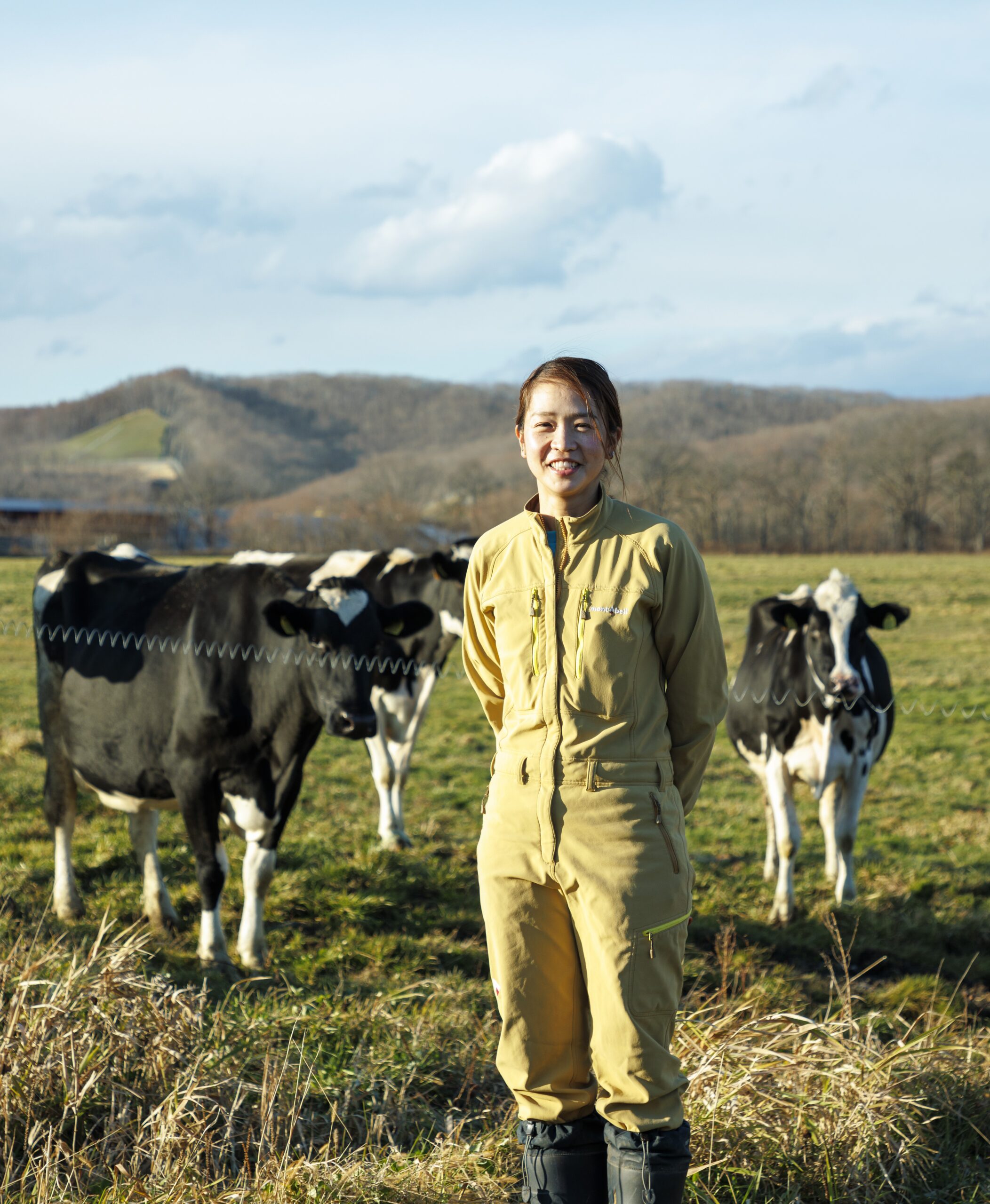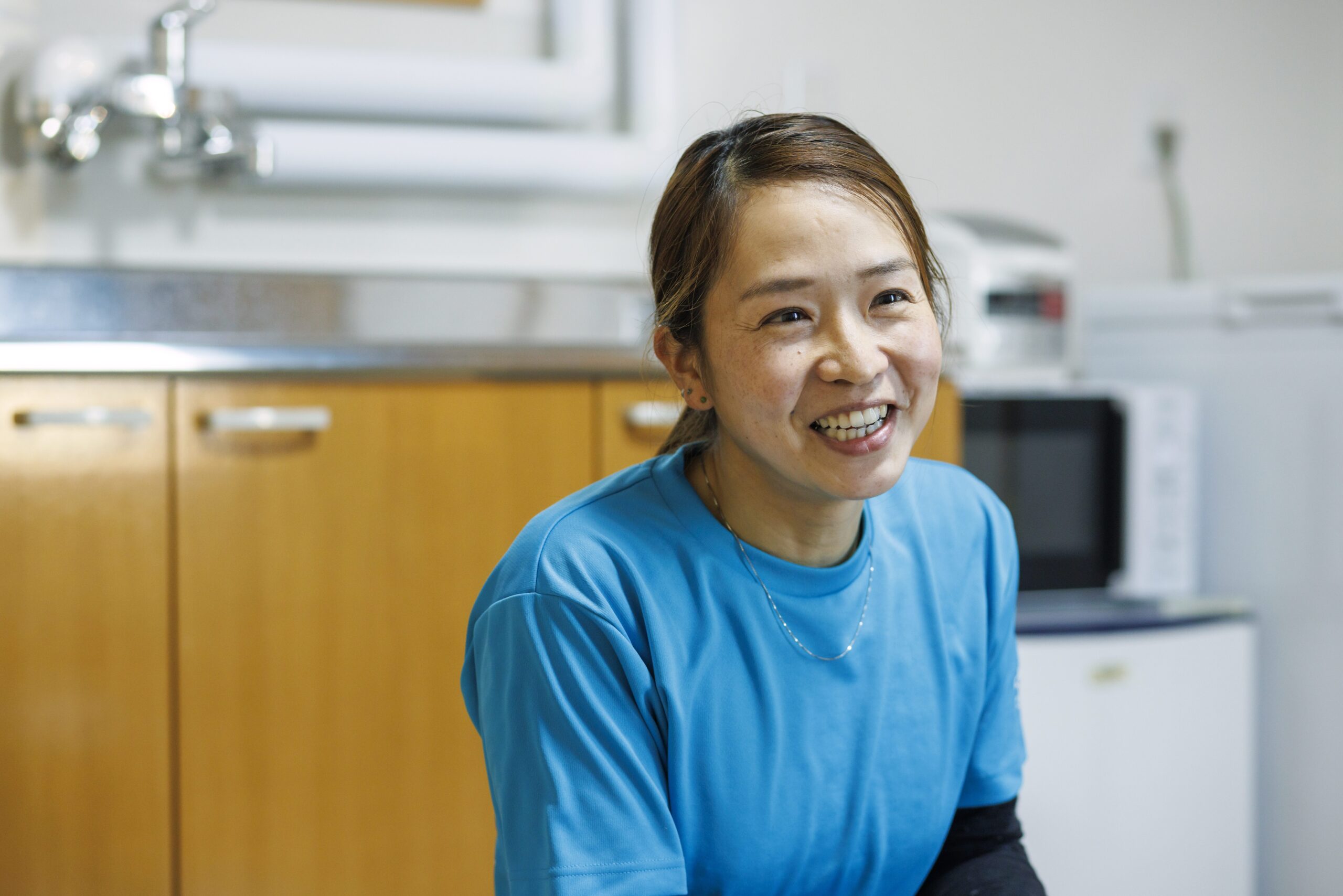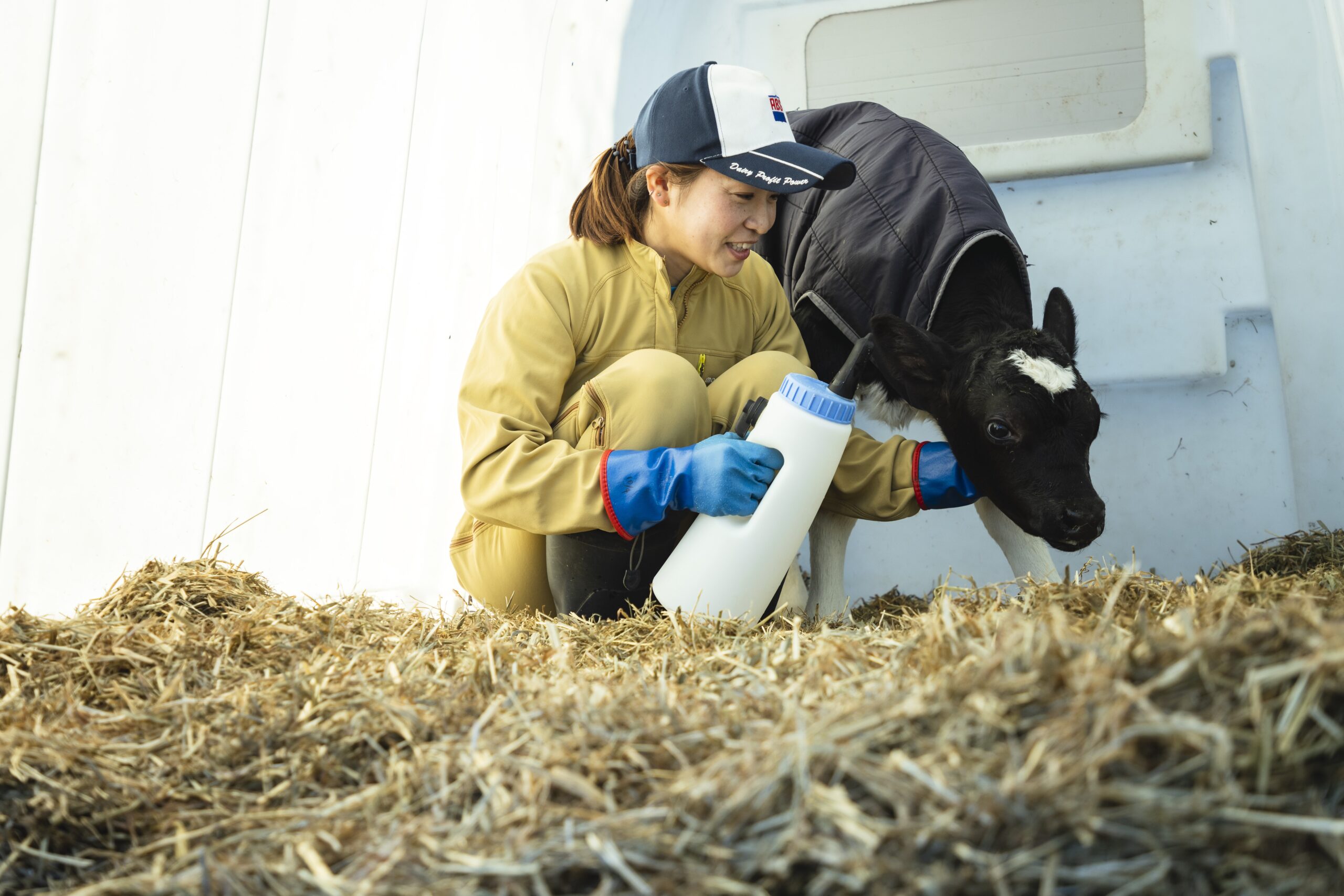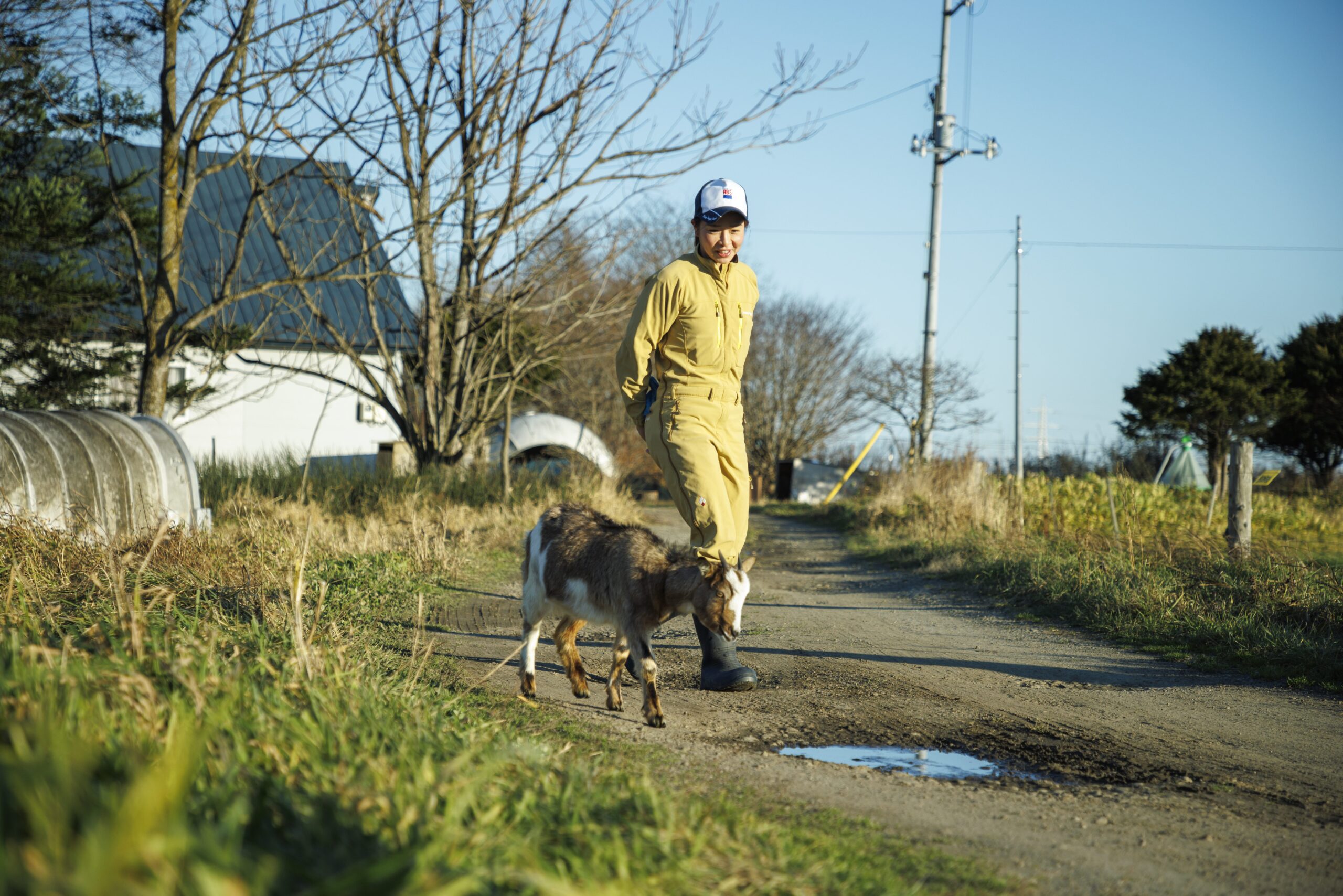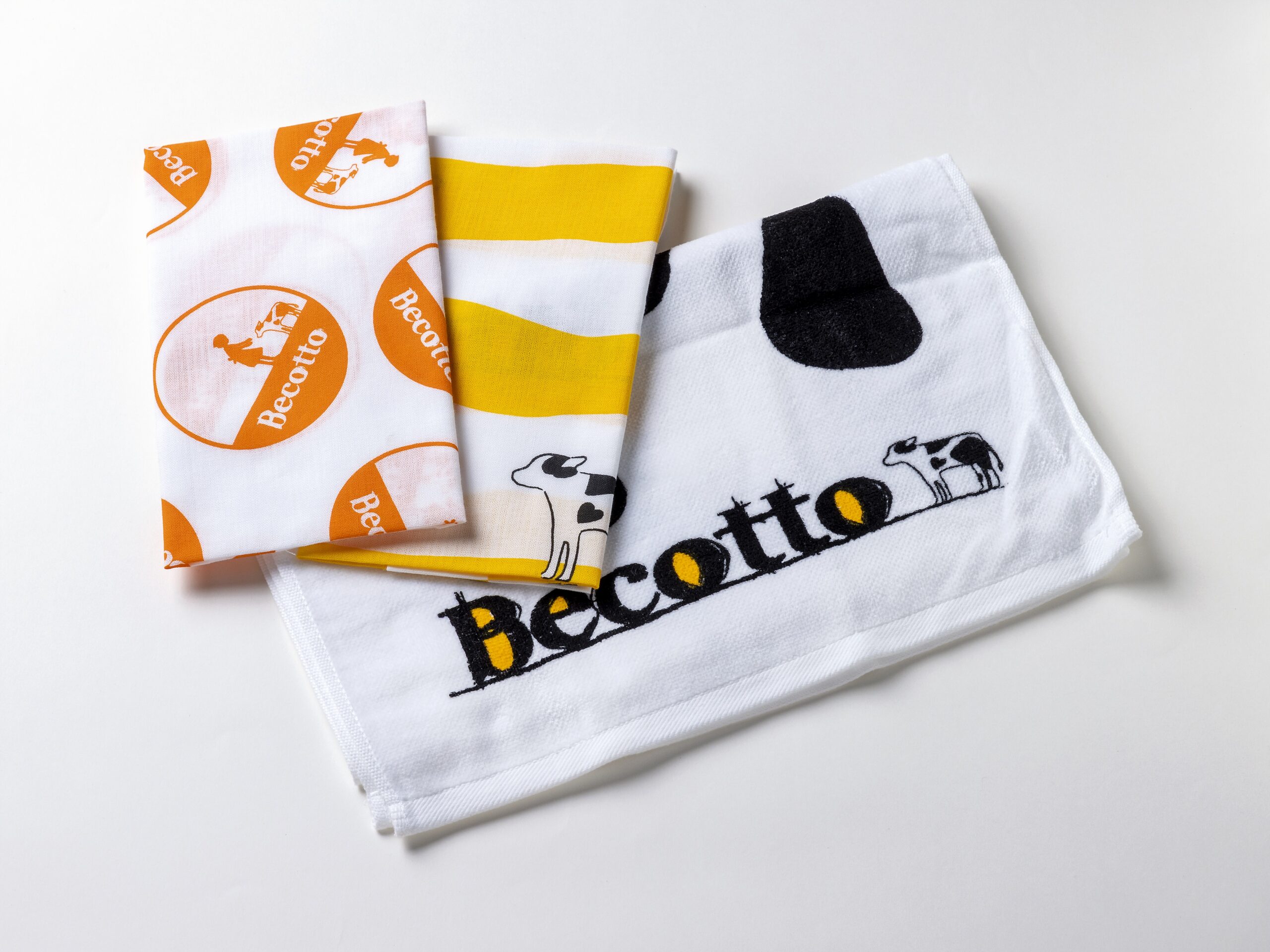A Fulfilling Life on a Dairy Farm in the Land of the North
University News | August 24, 2022
This article was published in the Spring 2022 issue of Litterae Populi. The full issue can be found here.
Naomi Yabuuchi moved to Kushiro City and has been engaged in dairy farming, growing and selling vegetables, and forming a group called “Becotto” with other female farmers of the same generation to communicate the appeal of farming through photo exhibitions and social media. She talked about how she got to where she is today, the life she now lives, and memories from her school days.
-
Naomi Yabuuchi
- Asano Farm Dairy Farmer.
Graduated from the School of Agriculture and the Graduate School of Agriculture.Born in Hyogo Prefecture in 1987, Naomi Yabuuchi graduated from the School of Agriculture at Hokkaido University in 2011. She completed the master’s program at the University’s Graduate School of Agriculture in 2013, and joined an agricultural material sales company in Mie Prefecture. She moved to Kushiro in Hokkaido in 2015 and started working as a dairy farmer at Asano Farm. She set up Becotto, a group of female dairy farmers in the Akan and Kushiro areas, to promote the appeal of dairy farming and agriculture on social media and other media.
What motivated you to apply to Hokkaido University?
When I went to my grandfather’s house, who was a farmer, I often played in the fields of rice paddies and sorts . There, I became interested in agriculture and began to think about going on to the School of Agriculture. I had a good image of Hokkaido, having visited there on a family trip, and I thought that Hokkaido University would be the right choice for studying agriculture.
I was interested in plants, so I joined the Laboratory of Crop Physiology of the Department of Agrobiology and Bioresources at the School of Agriculture, and I studied basic crop research, specifically the suppression of Japanese radish bolting, a phenomenon in which its stems elongate and flowers bloom, through my undergraduate and graduate (master’s) school years.
What did you focus on in your extracurricular activities?
I belonged to a club called Agees, where members experience farming through helping farmers, and we visited farmers on weekends and during extended vacations. At that time, I could sense a distance between agricultural science and actual agriculture practice. Some farmers accepted me with interest, wondering what agriculture students at Hokkaido University were learning.
Since most of the farmers in Hokkaido are full-time farmers, I was surprised by and interested in the fact that they make their living solely by farming in this vast land. I still keep in touch with some farmers who grow tomatoes and soybeans for miso.
Now that I am hosting students as a farmer, I have started to think about what I can do for students and what I can tell them. It’s interesting how my perspective has changed.
What prompted your move to Kushiro?
After completing graduate school, I worked for an agricultural material sales company in Mie Prefecture, and while working there in sales, I began to think that I wanted to work in agriculture myself. At that time, my senior at Agees and current partner asked me if I’d like to work with him on a dairy farm. I was also missing Hokkaido.
How is your work going now?
Our ranch is trying to streamline its management and may have shorter working hours than other ranches. I usually work from about 5:00 a.m. to 8:00 a.m. and from 4:30 p.m. to 6:30 p.m. I think I only work about five hours if there are no deliveries or problems. During the day, I work in the fields in summer and I do whatever I like in winter. I also like growing vegetables, so I don’t mind the work involved. We grow a variety of vegetables, mainly cherry tomatoes, as well as cucumbers, eggplants, peppers, corn, pumpkins, spinach, and radishes, although the growing season is short.
On Sundays, we directly sell the vegetables we grow at a nearby onsen facility. Direct sales are a great experience where I get paid for my crops.
What are the interesting and difficult aspects of your current job?
I enjoy everything about my life as a farmer. I produce food, I have milk and vegetables, and I can fish. I also have a hunting license, so I can hunt deer. I can raise goats. I can pick walnuts and Siberian onion. I have always longed to be self-sufficient, and I am now leading a life that is close to it. It’s fun to live a more “analog” life.
I don’t feel inconvenienced. As long as an optical fiber connection for the Internet is in place, I can live a comfortable life. Speaking of hardships, it is difficult when cows give birth in succession. Sometimes we have to take care of sick calves or calves that can’t stand up. When a cow escaped from the barn, we had a tough time bringing it back.
Tell us about Becotto.
There were about five women of the same age in the youth club of the Akan Agricultural Cooperative, and we started talking about having a women’s party, which got the ball rolling. It’s hard to make friends when you marry into a farming family. We talk about work, share our problems, and hold study sessions on cattle feeding. Empathy is important for women. When deciding on a name for the group, we all tossed around ideas and settled on Becotto.
Partly because of my love for photography, I started to show how the members are wearing colorful T-shirts and having fun together at photo exhibitions and on social media sites. We are working with the idea that if we enjoy dairy farming ourselves and take pictures of us doing so to show others, more people will become interested in dairy farming.
Do you feel that your experience at Hokkaido University has been useful?
In the end, it’s all about personal connections. I really like Hokkaido University students because they are rather relaxed but also very capable. It’s a great asset. Also, if I have a problem out in the fields, I can study and solve it. I think my problem-solving abilities were cultivated through the process of writing and presenting my undergraduate and master’s theses.
Finally, could you please offer a few encouraging words to Hokkaido University students?
I hope students will value people, listen to others, and simply expand and practice what they are interested in. Learning is deepened not only by input but also by output.
This article was published in the Spring 2022 issue of Litterae Populi. The full issue can be found here.

